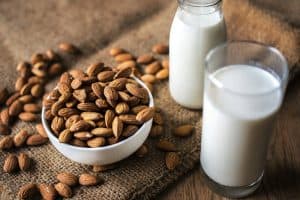Yes, you can consume almond milk during pregnancy and it offers some great health benefits. It is rich in antioxidants, a type of nutrient that is especially important for pregnant women. Antioxidants prevent birth defects and facilitate the growth of your baby. They also improve the health of your skin and hair and reduce your risk for heart disease. Moreover, almond milk is a rich source of vitamins and minerals such as calcium, vitamin A, and vitamin D. Therefore, it helps you maintain strong bones.
On the other hand, you should watch out for some side effects of almond milk while pregnant. If you are allergic to nuts, avoid this drink. According to the Journal of Nutrition, almonds can also weaken your thyroid gland which is why you should avoid it if you are suffering from thyroid dysfunction.
It’s also not a good idea to substitute almond milk for cow’s milk as it contains fewer calories. Hence, you reduce your caloric intake by replacing it which can cause weakness and fatigue.
Almond milk is not as rich in calories, proteins and other nutrients as regular cow’s milk.
Almond milk, though healthy and safe, is not a good replacement for regular milk as it is not as rich in calories, proteins and other nutrients as regular cow’s milk. Cow’s milk also contains iodine, which is essential for the growth of your baby. If you are unable to have cow’s milk because you are lactose intolerant, allergic or due to diary preferences, then you can replace it with other nut based milks such as almond milk. However, ensure your calorific and iodine requirements are met from other natural food sources.
Another scenario where it is recommended to replace cow’s milk with almond milk, is for the management of gestational diabetes. Unlike cow’s milk, almond milk is not a carbohydrate source and hence is a good dairy replacement in meals where you are looking for milk flavor without spiking your carb intake. However, read the label carefully as some brands of almond milk contain high amounts of added sugars or emulsifiers that can do more damage and may not help control your gestational diabetes either.
While making almond milk at home, ensure the ingredients are pasteurized. In the US, for example, all almonds available are generally pasteurized even if sold as raw almonds.
Bottom-line, while almond milk is safe to consume during pregnancy, it is not as nutritious as cow’s milk and should only be replace your milk intake if you are unable to consume regular cow’s milk due to allergy, intolerance or dietary restrictions.
Read about benefits and precautions while having cow’s milk here:
References:






